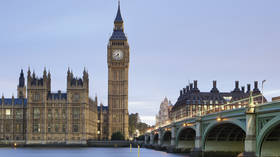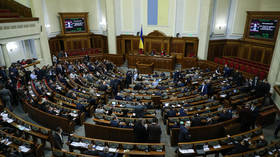Russia reveals UK sanctions reponse

Russia has vowed to respond if Britain hits it with punitive measures on the country’s companies and citizens, announced as a potential consequence of Moscow ordering any aggressive actions against Ukraine, amid increasing tensions in Eastern Europe.
Speaking in a briefing on Friday, Russian Foreign Ministry spokeswoman Maria Zakharova doubled down, insisting that should London act on its threat of embargos, the UK should expect a response in kind.
“We have taken note of the outrageous statements made by the British Foreign Office about its intention to pass a document through Parliament that would provide new grounds for sanctioning Russian legal entities and individuals,” she said.
According to Zakharova, “if the announced sanctions are applied indiscriminately to Russian companies… without any legally substantiated facts, this will be a serious obstacle in the development of trade and economic relations.”
“Our response will follow,” the diplomatic representative promised. She insisted that London would be shooting itself in the foot by slapping Moscow with sanctions, as that would undermine the UK’s “own investment attractiveness and actually threaten their big business.”
Her remarks come shortly after Britain unveiled a plan to sanction more Russian individuals and businesses should Moscow escalate its purported aggression against Ukraine. The ramped-up embargo package could mean that a broader range of people and companies linked to the Kremlin may face financial penalties.
In a statement, British Foreign Secretary Liz Truss vowed that “nothing is off the table and there will be nowhere to hide,” adding that the new measures “will amount to the toughest sanctions regime against Russia we have had in place yet, and mark the biggest change in our approach since leaving the European Union.”
Western leaders have repeatedly voiced concerns in recent months that Moscow’s armed forces were piling up at the Ukrainian border ahead of launching an invasion. The Kremlin, however, has vehemently rejected the claims, arguing that the movement of its troops was an internal matter and of no concern to any other state.













